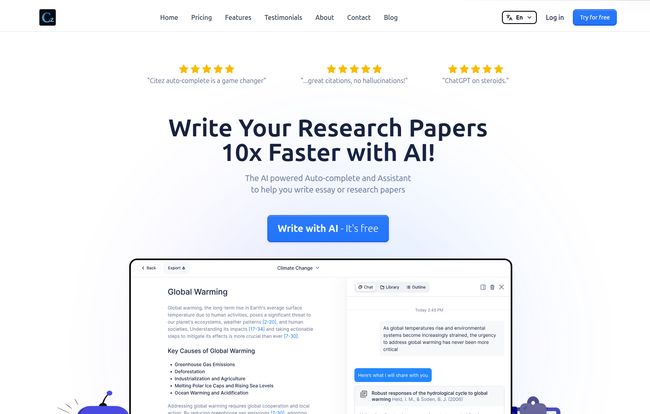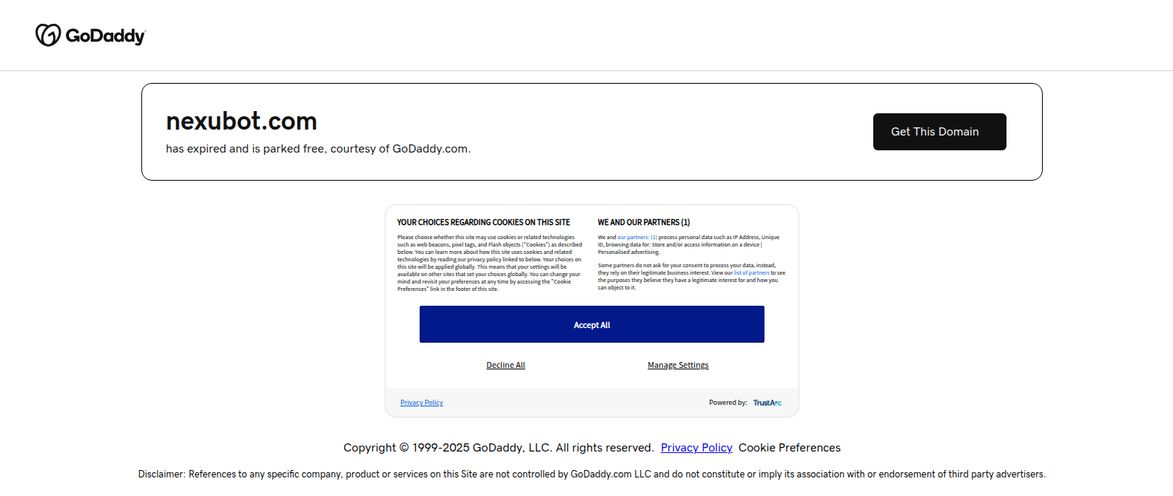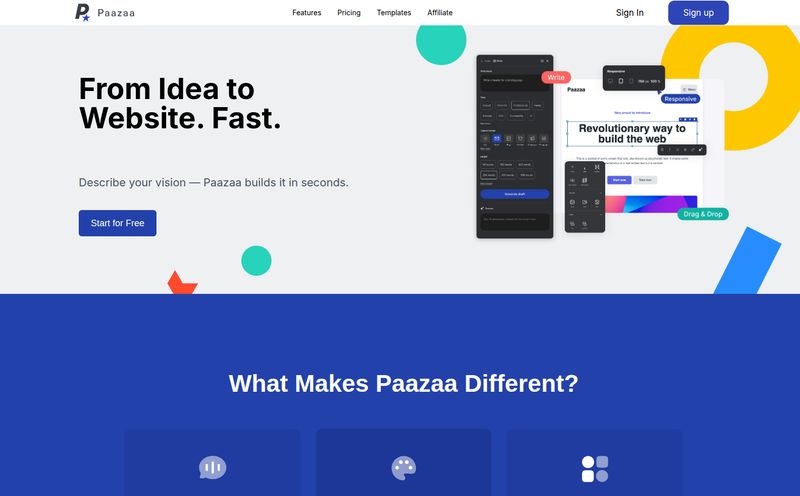Writing a research paper is a special kind of torment. You start with a spark of an idea, full of optimism. Then comes the slog. The endless hours in digital library stacks, the wrestling match with citation styles (APA, MLA, Chicago... pick your poison), and that gut-wrenching moment you realize a key source you've been leaning on is, well, not quite right.
It's a process that can feel like trying to build a Swiss watch in the dark. Meticulous, frustrating, and oh-so-slow. So when a tool like Citez pops onto my radar, promising to write research papers "10x faster," my inner skeptic and my exhausted inner student both sit up and pay attention. 10x faster? That's a bold claim. Is it just another AI hype train, or is it the research assistant we've all been dreaming of? I had to find out.

Visit Citez
So, What is Citez, Actually?
At its heart, Citez is an AI-powered writing platform designed specifically for the world of academia. Think of it less like a blunt instrument like some early-gen AI writers and more like a specialized toolkit. It's built to tackle the unique pain points of academic writing. Its main gig is to help you draft, organize, and—most importantly—cite your work without tearing your hair out.
The creators say they built it to empower researchers and students by streamlining their workflow. It's not just about spitting out text; it’s about creating a smarter research environment where you can find, analyze, and verify sources while the AI handles the grunt work. In a world where AI "hallucinations" (a polite term for 'making stuff up') are a real concern, having a tool that focuses on accurate citations from the get-go feels like a breath of fresh air.
My First Impressions and The Core Features
Loading up Citez, the first thing I noticed was the clean, uncluttered interface. It doesn't bombard you with a million options. It feels focused. It's clear they want you to just get in and start writing. But what really makes it tick? After playing around, a few features really stood out.
The AI Citation Engine: Your New Best Friend
This is the star of the show, in my opinion. We've all been there, frantically trying to format a bibliography at 2 AM. Citez integrates the citation process directly into the writing. You're not just writing a sentence; you're writing a sentence and instantly linking it to the source material. It pulls from journals and web sources, and the promise of accuracy here is everything. It's like having a meticulous librarian whispering in your ear, ensuring you're not accidentally plagiarizing or misrepresenting a source. This is more than a simple reference manager like Zotero or Mendeley; it's an active participant in your writing process.
AI Autocomplete That's Actually Smart
I've used a lot of autocomplete tools, and most of them feel... predictable. Citez's autocomplete feels different. It seems to have a better contextual grasp of academic language. It doesn't just finish your word; it suggests entire phrases and sentence structures that fit the formal, evidence-based tone of a research paper. It’s like a co-pilot, anticipating your next move and helping you articulate complex ideas more fluently. A real time-saver when you're trying to move from a rough outline to a full draft.
The AI Chatbot: A Research Buddy
The built-in AI Chatbot is another clever touch. It's not just a generic ChatGPT window bolted on. You can use it to brainstorm ideas, ask questions about your collected data, or get help structuring a paragraph. For example, you could ask it to "Summarize the key findings from these three papers" or "Suggest a counterargument to this point." It turns the solitary act of research into more of a conversation, which can be invaluable for getting unstuck.
Who Is This Tool Really For?
Okay, so who should be rushing to sign up? Citez is pretty clearly aimed at a specific crowd. If you're a university student drowning in term papers, this could be a lifesaver. For PhD candidates and academics living in the "publish or perish" world, the efficiency gains could be massive, helping you get from research to submission faster. Even professionals who need to produce white papers or in-depth reports could find a lot to love here.
Who isn't it for? If you're a creative writer or a blogger writing casual listicles, this is probably overkill. The tool's strength is its academic rigor. Also, if you're fundamentally opposed to using AI in your writing process, this won't change your mind. It's an assistant, not a magic wand, and it still requires your critical thinking to guide it.
Breaking Down The Citez Pricing
Alright, let's talk turkey. How much does this AI magic cost? The pricing structure is refreshingly straightforward.
| Plan | Price | Best For |
|---|---|---|
| Starter | $0 (with a 14-day free trial) | Individuals just getting their feet wet. Includes the core features like AI draft generation, autocomplete, and the chatbot. |
| Unlimited | $14 / month | Power users, researchers, and anyone who will be writing frequently. This unlocks unlimited words. |
A little note: I saw a price of $9/month on one part of their site, but the detailed info points to $14/month. I'm going with $14 as the official number, but it might be worth checking for any annual discounts.
Honestly, the free Starter plan is generous. It gives you more than enough runway to decide if the tool fits your workflow. The $14/month for the Unlimited plan feels very reasonable, especially when you compare it to the cost of your time and sanity. A few fancy coffees a month to potentially save dozens of hours? That's a trade I'd take.
The Good and The Not-So-Good: An Honest Take
No tool is perfect. After spending some time with Citez, here’s my balanced breakdown.
The Advantages
The speed is undeniable. It genuinely cuts down on the time it takes to organize sources and write a first draft. The accurate citation feature is a massive win, reducing the risk of errors and the tediousness of building a bibliography. It also helps streamline your entire workflow, keeping your research, notes, and draft all in one place. It’s a much more organized way to work than having 50 browser tabs and a dozen Word docs open.
The Potential Downsides
Let's be critical. The $14/month for unlimited use could be a barrier for some students on a tight budget, though the free plan is a great starting point. The bigger concern, and this applies to any AI writer, is the risk of becoming lazy. Relying too heavily on AI can atrophy your own critical thinking and writing muscles. You still need to be the captain of the ship. Finally, while Citez focuses on accuracy, it's still AI. You should always double-check its outputs and verify your sources. Always.
Frequently Asked Questions about Citez
Is there a free trial for Citez?
Yes, absolutely. The Starter plan is free and gives you 14 days to test out all the main features before you have to decide on a paid plan.
Does Citez use ChatGPT?
The website doesn't specify the exact large language model it's built on, but it's a proprietary system. Think of it as being powered by a similar class of technology, but fine-tuned specifically for academic writing and citation, which makes it different from a general-purpose tool like ChatGPT.
How does the AI citation work?
It integrates with your writing process. As you use the AI to generate text or write your own, it can pull information from its database of journal articles and web sources, automatically formatting the citation and adding it to your bibliography. It's designed to make the process almost frictionless.
Can Citez write a whole paper for me?
No, and that's a good thing. It's an assistant, not an author. It can help you generate a first draft, write paragraphs, and structure your arguments, but it still relies on your direction, your research, and your critical oversight to produce a high-quality, original paper. Think of it as a powerful collaborator.
Is it considered cheating to use a tool like Citez?
This is the big question, isn't it? It really depends on your institution's academic integrity policy. Using it to check grammar, organize notes, and format citations is generally fine. Using it to write the entire paper without original thought is not. The best approach is transparency. Check your university's guidelines and talk to your professor if you're unsure.
Final Thoughts: Is Citez Worth It?
So, back to the big question: is Citez the revolutionary tool it claims to be? I'm going to say... it's impressively close. For its intended audience, it's a powerful and thoughtfully designed platform. It doesn't try to be everything to everyone. It focuses on solving the most tedious and time-consuming parts of academic writing, and it does it well.
The claim of being "10x faster" might be a bit of marketing flair, but I have no doubt it can dramatically cut down on writing time. More importantly, it can reduce the friction and frustration of the process, which might be even more valuable. It turns the daunting mountain of a research paper into a series of manageable hills. If you're a student or researcher, I'd say giving the free trial a spin is a no-brainer. It might just be the smart, tireless research assistant you've been waiting for.



